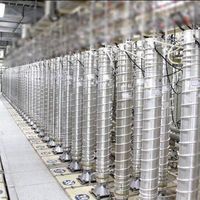Biden Defends His Record On Iran And The Middle East
Iran has been diplomatically isolated during his 18 months in office, President Joe Biden argued in an opinion piece published Saturday by The Washington Post.
Biden also wrote that the Middle East is “more stable and secure” now than during the presidency of Donald Trump.
Prior to his trip to the region Biden tried to defend his diplomatic record and efforts of military deterrence, arguing that attacks against US targets have decreased and a ceasefire has been declared in Yemen.
The President said that when he took office the United States was isolated on the issue of Iran, as his predecessor had withdrawn from the 2015 nuclear agreement known as the JCPOA, which “was working” and found itself “isolated and alone” at the United Nations Security Council.
“With respect to Iran, we reunited with allies and partners in Europe and around the world to reverse our isolation; now it is Iran that is isolated until it returns to the nuclear deal my predecessor abandoned with no plan for what might replace it,” he said.
Biden also took credit for a vote at the International Atomic Energy Agency’s Board of Governors on June 8, when “30 countries joined us to condemn Iran’s lack of cooperation,” he said and added, “My administration will continue to increase diplomatic and economic pressure until Iran is ready to return to compliance with the 2015 nuclear deal, as I remain prepared to do so.”
But the president also made a series of claims not exactly reflecting reality.
While there is more Western diplomatic coordination in dealings with Iran, but that country has almost reached a nuclear threshold stage during Biden’s presidency and is violating more US oil export sanctions. Iran has now sufficient enriched uranium for one nuclear bomb.
Biden said that after Trump’s withdrawal from the JCPOA, “Iran had passed a law mandating the rapid acceleration of its nuclear program.”
He was referring to a law tabled in the Iranian parliament on November 4, 2020, to elevate uranium enrichment to 20 percent, the day after the US election, and 17 months after Trump abandoned the deal.
The Iranian escalation came after candidate Biden published an opinion piece on CNN in September 2020 saying Trump’s decision was a big mistake and he would retore the JCPOA. It seemed that Iranians seeing Biden willing to negotiate escalated their nuclear program.
The escalation continued in early 2021 with uranium enrichment reaching 60-percent purity, as the Biden Administration began negotiations with Tehran.
Before Biden’s election, Tehran had retaliated against Trump by a small increase in the level of enrichment, but nowhere close to accumulating highly enriched fissile material for a bomb, as is the case now.
The President also made claims about more stability in the Middle East which leave room for questions.
He said that attacks against US targets substantially decreased after he ordered retaliation for Iran-backed rocket strikes. But US troops have been targeted at least 29 times since October 2021 without any military response, a critic said.
He also did not mention dozens of Iran-backed Houthi missile and drone attacks against Saudi Arabia in 2021 and 2022, with the aggression expanding to the United Arab Emirates earlier this year.
Iran also continues its terror activities in the region, as recent events in Turkey showed and pro-Iran groups such as the Hezbollah and Hamas maintain a highly aggressive posture toward Israel.








